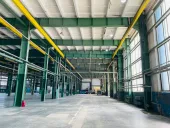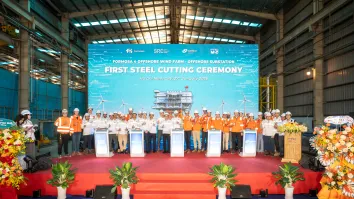Membrana unveils 8x20-inch stainless steel Liqui-Cel® Membrane Contactor
Beverage and pharmaceutical clients to benefit.
Membrana-Charlotte, a Division of Celgard, LLC, has introduced a new 8x20-inch stainless steel Liqui-Cel® Membrane Contactor to its portfolio of dissolved gas control products.
This FDA compliant device provides beverage and pharmaceutical customers with an option to economically design membrane-based systems with
flow rate requirements that fall in between existing low and high flow rate products available in the market today.
A single 8x20-inch Liqui-Cel® Contactor can process 1-11.4 m3/hr (5-50 gpm) and operate up to 10.3 bar (150 psig) at 25° C.
The contactor uses a 316L SS housing with sanitary connections and a cartridge of polypropylene hollow fibers which is placed inside the housing. This compact device has an average membrane surface area of 53 m2(570.5 ft2) making it highly efficient at adding or removing dissolved gases from liquid streams. Membrana-Charlotte combines advanced membrane knowledge, application experience and Liqui-Cel®
Membrane Contactor expertise to provide innovative separation solutions. Liqui-Cel® Membrane Contactors have low energy requirements and can reduce chemical use which contributes to low operating costs and supports customer sustainability objectives.
Liqui-Cel® Contactors are modular and compact and can achieve very low dissolved gas outlet concentrations. They are rapidly replacing older deaeration technologies as the product of choice in power generation, semiconductor, oil/gas, food and beverage, pharmaceutical, analytical/biotechnology and many other industries. Liqui-Cel®Membrane Contactors also operate cleanly and require much less space compared to other technologies.
These devices have processed over 749,000 m3/hr (3.3 million gpm) of liquids worldwide and have been operating in a variety of applications for over 20 years.
Dissolved CO2 removal from water can improve Ion Exchange (IX) and EDI/CDI efficiency after RO. For example, In EDI/CDI systems excess CO2 can lead to the formation of ionic species that contribute to the total ionic load of an EDI unit, resulting in higher conductivity. In IX systems, reducing dissolved CO2 concentration lowers bed regeneration frequency resulting in more efficient operations. Chemical consumption, such a NaOH, can also be reduced in double pass RO systems.
O2 also negatively impacts many processes; it is corrosive and can oxidize water treatment system components. In the power and industrial areas, piping and equipment are susceptible to corrosion. In the semiconductor and ink markets, high levels of dissolved gases can cause lower yields and slower process speeds. Liqui-Cel®
Contactors are also used to add gases to liquids to enhance megasonic cleaning. The beverage industry utilizes membrane contactor technology for carbonation, nitrogenation and deoxygenation. These applications are only a few examples of the many opportunities where Liqui-Cel® Membrane Contactors can be used for gas transfer. Membrana’s Industrial & Specialty Filtration Business also manufactures a variety of membranes and devices
used for filtration in various industries and applications.



















 Advertise
Advertise







